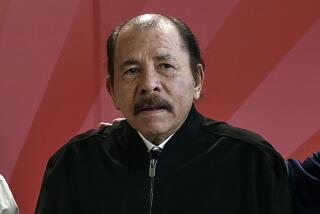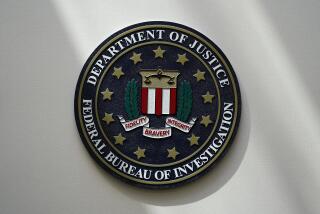Ex-CIA Man Testifies for Nicaragua
- Share via
THE HAGUE — A former intelligence analyst for the CIA told the World Court today that in 1981 the agency prepared a plan to destabilize Nicaragua’s leftist regime and President Reagan approved it.
Speaking during the second day of a case brought by Nicaragua against the United States, David Macmichael was asked by Abram Chayes, a lawyer for Nicaragua: “Were you advised of a plan being prepared for the U.S. President calling for covert action against Nicaragua?”
“Yes, I was,” replied Macmichael, who worked as a contract employee for the CIA from March, 1981, until April, 1983.
Macmichael’s testimony was presented in support of Nicaragua’s charges that the United States trained, supplied and directed the rebel army that has been fighting for four years to overthrow the Sandinista government.
Administration Won’t Respond
Although the Reagan Administration refuses to respond to the charges, U.S. involvement with the rebels has been openly debated in Congress and the American press for years.
Macmichael told the court that in the fall of 1981, a plan was discussed in the Latin American Affairs Office of the CIA to send a covert force of 1,500 armed men into Nicaragua.
Macmichael told the 15-judge tribunal, the judicial arm of the United Nations, that the plan was “put forward as a program to destabilize the Nicaraguan government or reduce the menace Nicaragua posed to the region.”
Asked by Chayes whether Reagan approved the plan, Macmichael responded: “He did.”
The 57-year-old former CIA analyst said the agency expected that the Nicaraguan government would respond to the proposed actions with “hot pursuit across its international borders, a clampdown on civil liberties, and ultimately, the harassment of U.S. Embassy personnel in Managua.”
Top-Secret Clearance Claimed
Claiming he held a top-secret security clearance at the time, Macmichael said the CIA assumed that the Sandinista reaction “would serve to demonstrate that the Nicaraguan government was inherently aggressive and a menace to its neighbors, and would possibly allow for sanctions against Nicaragua under the (Organization of American States) charter.”
Nicaragua, he said, “had successfully portrayed itself as open and democratic in world public opinion. It was expected that it would lose support when its true nature was to be displayed.”
Macmichael added that the expected harassment of U.S. diplomatic personnel in Nicaragua would “demonstrate the essential hostility of Nicaragua toward the United States.”
Macmichael, a former U.S. Marine, is now senior assistant to the Council of Hemispheric Affairs in Washington and lives in Reston, Va.
More to Read
Sign up for Essential California
The most important California stories and recommendations in your inbox every morning.
You may occasionally receive promotional content from the Los Angeles Times.










